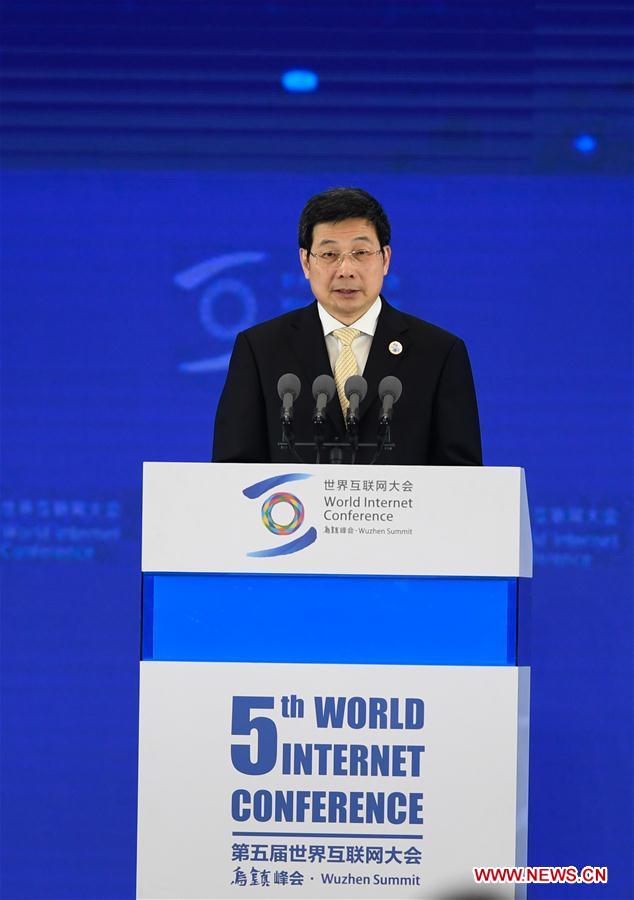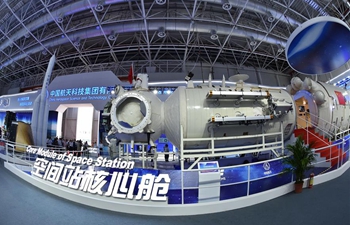 ?
?
Zhuang Rongwen, head of the Cyberspace Administration of China, speaks at the closing ceremony of the fifth World Internet Conference (WIC) in Wuzhen Town of Tongxiang, east China's Zhejiang Province, Nov. 9, 2018. The WIC closed on Friday. (Xinhua/Huang Zongzhi)
HANGZHOU, Nov. 9 (Xinhua) -- As the World Internet Conference (WIC) celebrates its fifth anniversary in the river town of Wuzhen, eastern China's Zhejiang Province, China is moving forward to the new era of digital economy and technological advances. And Wuzhen has been at the center of this innovation.
Held from Nov. 7 to 9 in Wuzhen, this year's conference aims to advocate exchanges, mutual learning, cooperation and sharing in the digital fields and to push for peace and development of the global cyberspace.
"As we can feel in Wuzhen, China's digitalization is speeding up and the town is becoming more and more international," Pony Ma, chairman and CEO of Tencent Inc., told participants of the conference on the opening ceremony Wednesday.
"It's fair to say that Wuzhen has become an epitome of China's booming Internet industry," said Ma.
About 1,500 guests from 76 countries and regions, including government representatives, heads of international organizations, leading figures of internet companies, online celebrities, experts and scholars, attended the conference.
INTERNET IMPRINT
Sharing dressing tips, square dance classes and self-performing Shaoxing opera with fans, Hu Hui, 80, has gained about 10,000 views from her popular live streaming on the Chinese video-sharing app Douyin.
"To many, retired elderly people are supposed to sit quietly while reminiscing about their old days, but the Internet has changed everything," Hu said.
Living in Wuzhen, many senior citizens like Hu are enjoying a youthful lifestyle -- shopping online, paying with smartphones and sharing their daily life on live streaming platforms.
During visitors' stay in Wuzhen, they are free to access as face-scanning technology has replaced the gate pass. They can also check in at the Binzhi AI Hotel by only swiping their ID card and scanning their face.
In this digital town, some of the latest technological innovations, once viewed as the stuff of science fiction, have come into reality.
At the Light of Internet Expo held during the WIC, a model of cashier-less fruit grocery, powered by visual identification technology of ArcSoft Inc., uses a number of cameras to identify the fruits chosen by customers, allowing them to grab goods and check out on their own.
The foldable smartphone with two 7.2-inch flexible screens produced by Visionox Co., can be flipped open like a book or folded to fit into one's pocket.
Chinese tech giant Baidu also showcased its newly developed self-driving bus named Apolong at the expo.
Without a steering wheel, driver's seat, accelerator or brake, the bus is able to navigate smoothly on roads while avoiding pedestrians and other vehicles.
The inside of the vehicle resembles an entertainment room where passengers can watch movies, sing karaoke and enjoy a carefree ride.
The bus began mass production in July and has been put into operation in semi-enclosed and enclosed areas, such as scenic areas and industrial parks, in Beijing, Xiamen and other Chinese cities.
"I see tens of thousands of self-driving vehicles running on connected roads in the future," said Zhang Yaqin, president of Baidu. "This will bring fundamental changes to the relationship between men, vehicles and cities."
Chinese information and communications technology giant Huawei is also looking to empower the self-driving vehicle industry with its latest 5G technology.
DIGITAL BOOM
The conference also released World Internet Development Report 2018 and China Internet Development Report 2018 Thursday morning.
In 2017, the size of China's digital economy grew to 27.2 trillion yuan (3.9 trillion U.S. dollars), accounting for 32.9 percent of the nation's gross domestic product (GDP), 2.6 percentage points higher than that of last year.
Besides, the booming digital economy contributed about 55 percent to the country's GDP growth in 2017. As of December 2017, China has a total of 102 listed Internet enterprises home and abroad, up 12 percent year on year.
The reports also said, as of June, the number of China's netizens reached 802 million, among which 788 million are mobile phone users.
The volume of information consumption increased from 2.2 trillion yuan in 2013 to 4.5 trillion yuan in 2017, with a year-on-year growth of about 20 percent, which accounts for 10 percent of the final consumption, said the reports.
"In the last five years, we've seen China move into the heart of the digital economy, not just in numbers, but also with innovation," said Fadi Chehade, senior consultant of the executive chairman of the World Economic Forum.
The conference on Wednesday unveiled the top 15 latest global scientific and technological achievements, selected by a committee of 40 Chinese and foreign experts from about 400 entries.
Among them are the WeChat mini-programs from Tencent, the AI processor from Huawei, the intelligent cybersecurity protection system from the 360 Group and an AI open platform for smart homes from Xiaomi.
"Digital economy means an open economy. It has no future without opening up. China views the digital economy as a common opportunity for global development," said Zhuang Rongwen, director of the Cyberspace Administration of China and deputy director of the State Council Information Office.
"We are willing to deepen cooperation with other countries to further promote the digital economy and make a bigger cake of development through cross-border e-commerce and open markets," Zhuang said.















